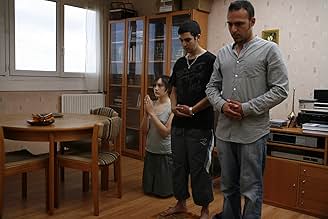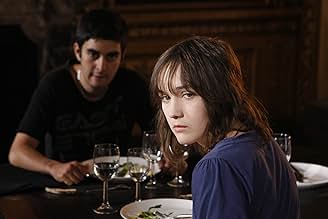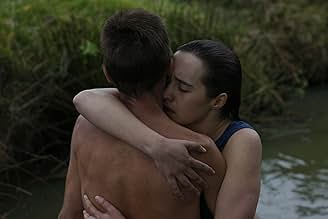PUNTUACIÓN EN IMDb
6,7/10
2,2 mil
TU PUNTUACIÓN
Añade un argumento en tu idiomaA young nun is expelled from a convent because of her extreme devoutness and forms a relationship with a radical Muslim.A young nun is expelled from a convent because of her extreme devoutness and forms a relationship with a radical Muslim.A young nun is expelled from a convent because of her extreme devoutness and forms a relationship with a radical Muslim.
- Premios
- 1 premio y 2 nominaciones en total
Argumento
¿Sabías que...?
- CuriosidadesThe French film magazine 'Cahiers du cinéma' included Hadewijch (2009) in their Top 10 list for 2009 as No.10.
- ConexionesFeatured in Conversations avec... (2018)
- Banda sonoraL'art de la Fugue
interpreted from La Mathilde
composed by Johann Sebastian Bach
performed by Elliot Simon, Guillaume Pera, Julien Jadczak, Olivier Boulanger & Yoan Bassinet
Reseña destacada
Celine is a young novitiate nun who is sent out of the nunnery by her Mother Superior because she is too full of self-love, is too extremist, mistakes abstinence for martyrdom, she needs to test her faith in the real world. Everything she goes through is an attempt to get closer to God. Her novitiate name is Hadewijch, after the 13th century mystic. She's seen at home in the Ile Saint Loue, in a lavish dwelling in modern day Paris with her dog, lounging about or strolling through the corridors and rooms of her affluent parent's, her father a minister, her mother detached, Celine seems alienated. She meets Yassine, a young street thief from the projects, who takes her to a punk concert and realizes she's not interested in sex with him. She pledges herself to Christ and has the mystic's desire to draw closer to His body. Yassine thinks(rightly?)she's nuts, being the only normal person(and very funny)in the story. When she puts her head on his shoulder, he asks does she want love? Dumont does not explore her character: how she became so religious, the roots of her antagonism with her father.Celine is infatuated with God.
She attends a church where Bach is being played by a quartet and is uplifted by it. Sokolowski's face filled with an inner radiance.Yassine breaks the law, steals a motor-bike and goes through red lights with Celine on the back. He introduces her to his older brother Nassir, who is a devout Muslim, and gives talks in the back of a kebab shop about Islamic belief. He can't understand why she suffers for the 'love' of God, she 'must act if you have faith...continue the creator's work'. He says 'innocence' doesn't exist in a democracy, where people vote but take no responsibility. God is a 'sword for truth and justice'. He takes her to an Arabic country to see the humiliation inflicted. She meets a group of terrorists. She declares herself 'with' Nassir, saying she's 'ready' to fight the cause as a way of getting closer to God. We are given to understand she plants a bomb in Paris. There is a street explosion, she travels below on a tube train with Nassir. We take it she was the 'chosen' one. Police go to the convent to ask her questions, but she escapes, pursued by the demons of self-doubt, in the absence of God.
Celine torments herself in her search for God. Julie Sokolowski embodies the ingenue otherworldliness and childlike candour of Celine, with a wan-faced pallor, a bodily awkwardness, suggesting her vulnerability. Her fear that she has paid too high a price, feeling no closer to God, for her actions. Dumont's camera is usually at head height and fairly close up, moving through landscapes in long shots. David, a shirtless Mason and convict on parole who has been working in the convent grounds, comes to play a major part in Celine's salvation as a form of embodied grace. In a world without God there is still the need for the sacred and the spiritual. Dumont shows various forms of fanaticism merging. God is in the humanity of our ordinary, modern world. Dumont takes us on a journey with Celine, the film as mystical act, a poem not to be interpreted at face value, with surrealistic ellipses and lacunae, reason breaking down, we take things on faith. Dumont makes us empathise with Celine. The ending is a problem, instead of signing off with an act of terrorism, Dumont brings in a miraculous climax, the coda a mystery of love, to send you out the door with too many questions in your head. Disturbing, haunting, cathartic.
She attends a church where Bach is being played by a quartet and is uplifted by it. Sokolowski's face filled with an inner radiance.Yassine breaks the law, steals a motor-bike and goes through red lights with Celine on the back. He introduces her to his older brother Nassir, who is a devout Muslim, and gives talks in the back of a kebab shop about Islamic belief. He can't understand why she suffers for the 'love' of God, she 'must act if you have faith...continue the creator's work'. He says 'innocence' doesn't exist in a democracy, where people vote but take no responsibility. God is a 'sword for truth and justice'. He takes her to an Arabic country to see the humiliation inflicted. She meets a group of terrorists. She declares herself 'with' Nassir, saying she's 'ready' to fight the cause as a way of getting closer to God. We are given to understand she plants a bomb in Paris. There is a street explosion, she travels below on a tube train with Nassir. We take it she was the 'chosen' one. Police go to the convent to ask her questions, but she escapes, pursued by the demons of self-doubt, in the absence of God.
Celine torments herself in her search for God. Julie Sokolowski embodies the ingenue otherworldliness and childlike candour of Celine, with a wan-faced pallor, a bodily awkwardness, suggesting her vulnerability. Her fear that she has paid too high a price, feeling no closer to God, for her actions. Dumont's camera is usually at head height and fairly close up, moving through landscapes in long shots. David, a shirtless Mason and convict on parole who has been working in the convent grounds, comes to play a major part in Celine's salvation as a form of embodied grace. In a world without God there is still the need for the sacred and the spiritual. Dumont shows various forms of fanaticism merging. God is in the humanity of our ordinary, modern world. Dumont takes us on a journey with Celine, the film as mystical act, a poem not to be interpreted at face value, with surrealistic ellipses and lacunae, reason breaking down, we take things on faith. Dumont makes us empathise with Celine. The ending is a problem, instead of signing off with an act of terrorism, Dumont brings in a miraculous climax, the coda a mystery of love, to send you out the door with too many questions in your head. Disturbing, haunting, cathartic.
- jon1410
- 17 oct 2015
- Enlace permanente
Selecciones populares
Inicia sesión para calificar y añadir a tu lista para recibir recomendaciones personalizadas
- How long is Hadewijch?Con tecnología de Alexa
Detalles
- Fecha de lanzamiento
- País de origen
- Sitios oficiales
- Idiomas
- Títulos en diferentes países
- 하데비치
- Localizaciones del rodaje
- Empresas productoras
- Ver más compañías en los créditos en IMDbPro
Taquilla
- Presupuesto
- 3.400.000 € (estimación)
- Recaudación en Estados Unidos y Canadá
- 5006 US$
- Fin de semana de estreno en EE. UU. y Canadá
- 1892 US$
- 26 dic 2010
- Recaudación en todo el mundo
- 74.586 US$
- Duración1 hora 45 minutos
- Color
- Mezcla de sonido
- Relación de aspecto
- 1.66 : 1
Contribuir a esta página
Sugerir un cambio o añadir el contenido que falta

Principal laguna de datos
By what name was Hadewijch (2009) officially released in Canada in English?
Responde





















